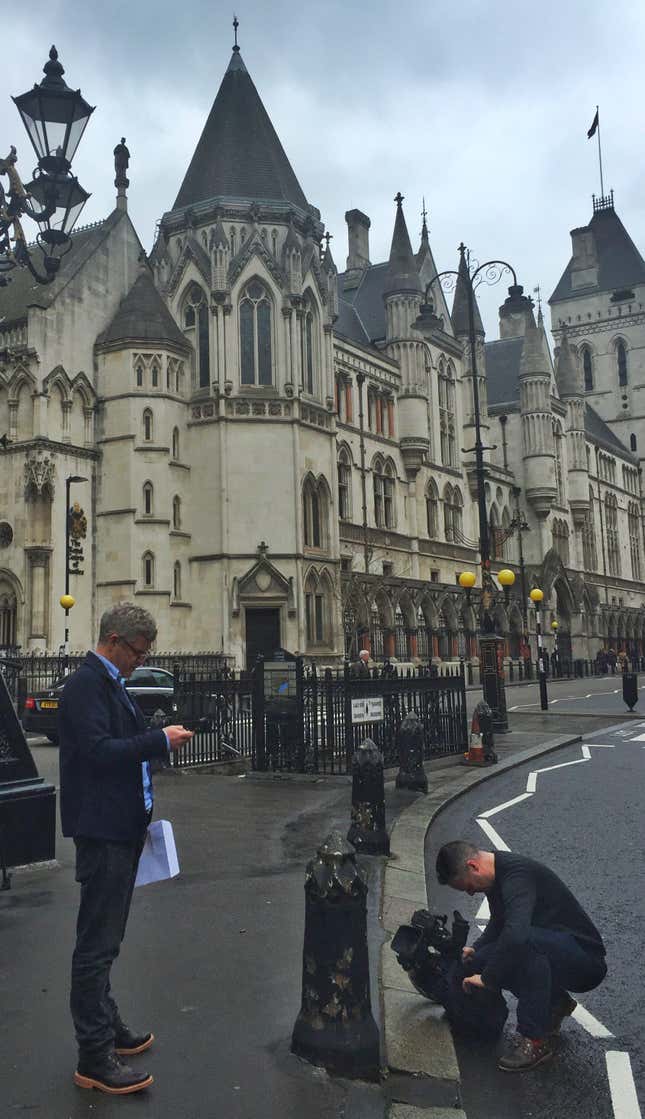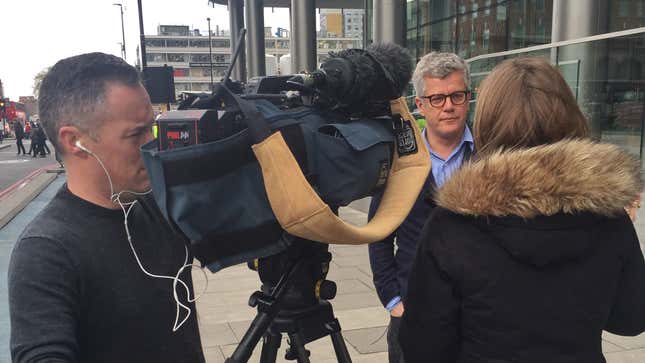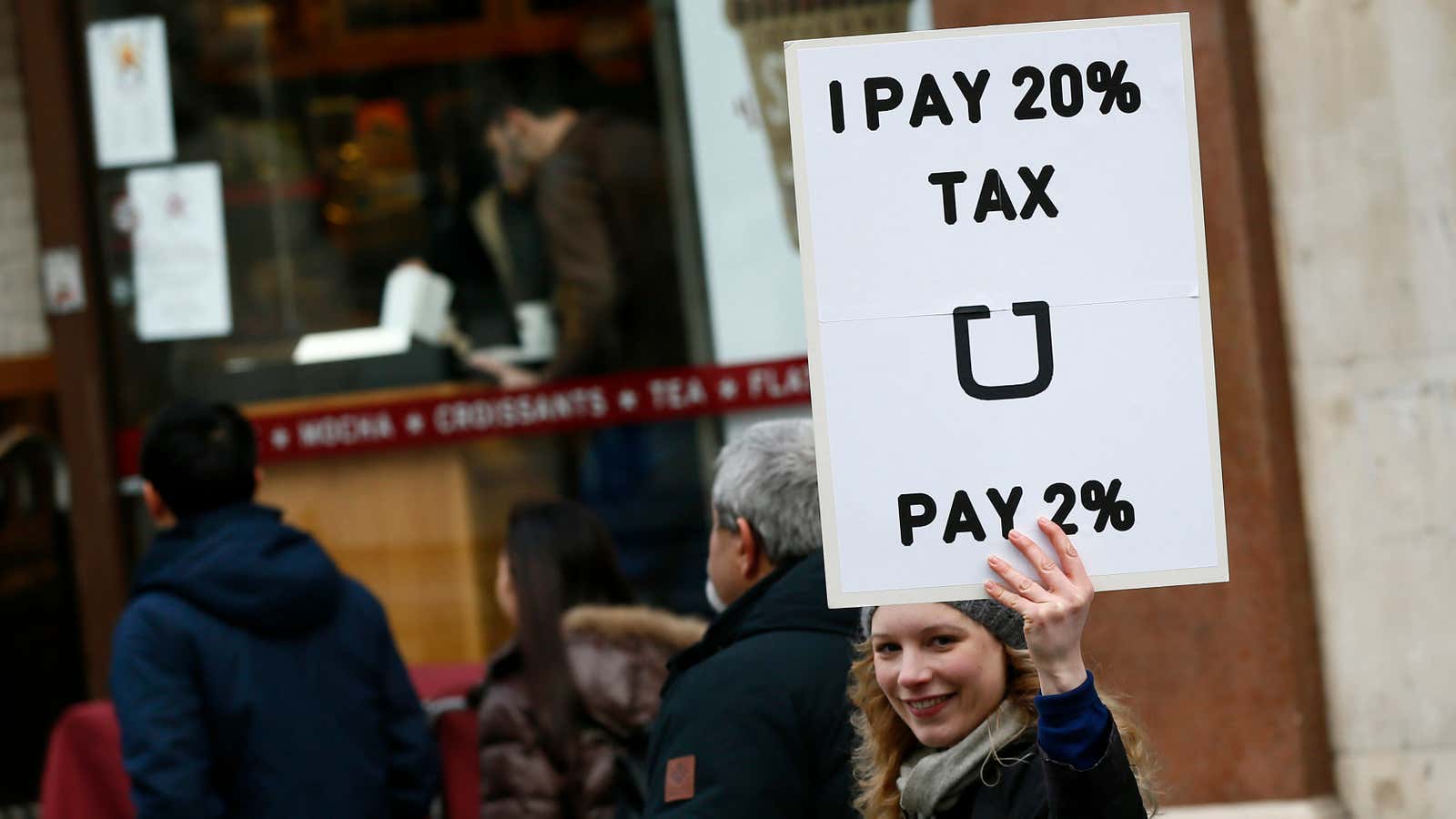Like thousands of other Londoners, Jolyon Maugham took an Uber this morning (Mar. 20). For the service of being driven from his office to Uber’s UK headquarters, he paid £9.86 ($12). Had the driver known what the accomplished tax lawyer was about to do next, he would not have accepted the ride request. Maugham was there to hand deliver a letter that would become the first step of suing the $68-billion startup for tax avoidance.
That’s why, on what was otherwise a cold and rainy morning, Maugham was unusually upbeat. If his case succeeds, Uber would end up owing the UK government hundreds of millions of dollars. What’s more is that, given how similar tax laws exist in 160 other countries, his case could open the floodgates for similar litigation, and Uber could end up owing such large sums all across the world.
Legal hinges
Maugham alleges that Uber is avoiding paying “value added tax” (VAT), a form of sales tax paid on goods and services in the UK and other countries. Barring some exceptions, such as food and children’s clothing, a UK consumer pays about 20% tax on the cost of any item or service.
The case, which will be filed in the London high court in April, hinges on a statutory entitlement that every UK citizen has to ask for a VAT receipt. The receipt is proof that the supplier of said goods or services is paying a certain amount to the UK government.

At the heart of the matter is how to define a “service.” Uber says that its drivers are “self-employed,” which means any VAT owed should be paid by the drivers. The earnings VAT threshold in the UK is £83,000 ($100,000), which is far more than a typical taxi driver would make and thus very few, if any, are likely to pay VAT.
“Drivers who use the Uber app are subject to the same VAT laws as any other transportation provider in the UK,” a spokesperson for Uber said.
However, a 2016 case in the UK ruled that drivers using Uber’s apps are defined as workers, and thus have workers’ rights, such as a guaranteed minimum wage, holiday pay, and the right to take breaks. “Because the drivers are working for Uber,” Maugham says, “the consequences of the tribunal’s decision is that it must be Uber supplying the transportation services not the workers.”
Uber is contesting the ruling. Even if it is overturned, Maugham isn’t worried because he has other reasons to claim that Uber is providing a service.
“There is an added value to what Uber is doing when it connects drivers to passengers,” said Rita de la Feria, professor of tax law at the University of Leeds and a leading expert on VAT. “So Uber is indeed providing a service, otherwise it wouldn’t exist.”
If Maugham’s challenge stands, Uber wouldn’t just owe money but it could also lose its cost advantage. The VAT it will need to pay will be about 20%. (Though Uber’s price advantage varies across the world, if other countries also succeed to add VAT on Uber, it will make a big dent.)
Retrospective pain
If Maugham wins, Uber could be liable for retrospective taxes, too. The ride-hailing company has been operating in the UK since 2012. Maugham’s back-of-the-envelope calculations suggest that the sum owed could be in the hundreds of millions of pounds.
But de la Feria is not so confident. Uber could use the “principle of legitimate expectation” and claim that it didn’t know its service was liable for paying the VAT.
There is, however, a principle that could work against Uber: “influence of foreign decisions on national courts.” As the world globalized, national courts, which previously tended only to look for precedence in courts within national borders, started looking beyond. When laws are similar, such as in the case of VAT, countries will look at the UK to consider whether suing Uber for avoiding VAT in their own country would be worthwhile.
Just last month, an Australian federal court ruled that Uber drivers (not Uber itself) must pay goods and services tax (GST), which is just like VAT in the UK. The case’s outcome could influence the decision of the London court in Maugham’s case.
Taking on a giant

Maugham’s case against Uber is strong, tax experts say. That raises a fair question: why did nobody think of attacking Uber like this before? The answer is likely because of the cost of litigation to take on a corporate giant.
Most tax avoidance cases are brought on by governments against corporations. However, in recent decades, according to de la Feria, globalization has created multinationals that have a financial might that’s even greater than that of governments. This puts tax departments under pressure to make sure a case is worth the risk of losing vast sums of taxpayer money in litigation.
Maugham, too, faces that difficulty. Uber would be ready to spend millions to save such a huge tax burden, and if it wins then Maugham would be liable to pay those fees. That’s not something he can afford. In fact, he is crowdfunding the money needed to fight the case to start with.
But as a private individual, if Uber tries to muscle him out, he says he will request the court to cap such liabilities. It’s something that the court has done in the past, for example in the court case that forced the UK government to seek a parliamentary vote to trigger Brexit.

Maugham has all but given up his day job, which used to be helping rich clients and companies fight legal disputes with the government. Just last month, he filed a case in the Irish court that he thinks can give the UK parliament a way to reverse Brexit if they so wish.
“I’ve wanted for some time to respond to the changed political environment that we live in,” he said. In the UK, Maugham believes that the Conservative government has no real opposition. So he started the Good Law Project to use court cases as a way to hold the government and its agencies accountable.
With the Uber case, Maugham has a larger point to make. He believes that the UK (and perhaps other governments around the world) are striking deals with multinational companies that in the short term bring new jobs, but in the long term create an uneven playing field for other companies.
In 2016, for instance, the UK government struck a deal with Google to pay some £130 million ($185 million at the time) in what were likely taxes it avoided. But other countries in the EU saw it as a “sweetheart” deal, Maugham says. France’s finance minister said deal “seems more the product of a negotiation than the application of the law.”
Such deals can’t be scrutinized by journalists or the public, because of tax privacy laws. But Maugham’s antic to seek a VAT receipt from Uber allows him to get in between the multi-national and the tax authority.
The case could become a big deal for other reasons, said de la Feria. It will be the first she knows where a private individual is able to probe the tax liabilities of a corporation. “This could open the floodgates,” she said. Any person would be able to investigate whether a corporation is paying the taxes that it should.
Piling on
Uber will try all it can to fight Maugham, but muscling him out won’t be easy. “Uber has two fights,” said Alex Cobham, CEO of Tax Justice Network, an advocacy group, “one in the court of justice and another in the court of public opinion.” On the latter it hasn’t been doing well.
Once a Silicon Valley darling, Uber is now a troubled giant. Yesterday (Mar. 19), its president, Jeff Jones, quit merely six months into the job. Recode reports that Jones’s resignation is likely linked to sexism and sexual-harassment allegations made by past employees against Uber.
The news came on top of a series of other resignations in the past few months amid strong public backlash. Last month, CEO Travis Kalanick was caught blowing up at a driver. And Uber has also received a flurry of one-star ratings on the iOS App Store. Before that, in January, an airport kerfuffle caused #deleteUber to trend on Twitter, and led Kalanick to step down from US president Donald Trump’s economic council. Its misdoings, such as breaking local laws, attacking politicians, and offending cities, are finally catching up.
“In 20 years, the idea of Uberization will either be a footnote of a period when people tried beating regulations,” Cobham said, “or it will be the basis of re-interpretation of a great deal of economic activity.”
